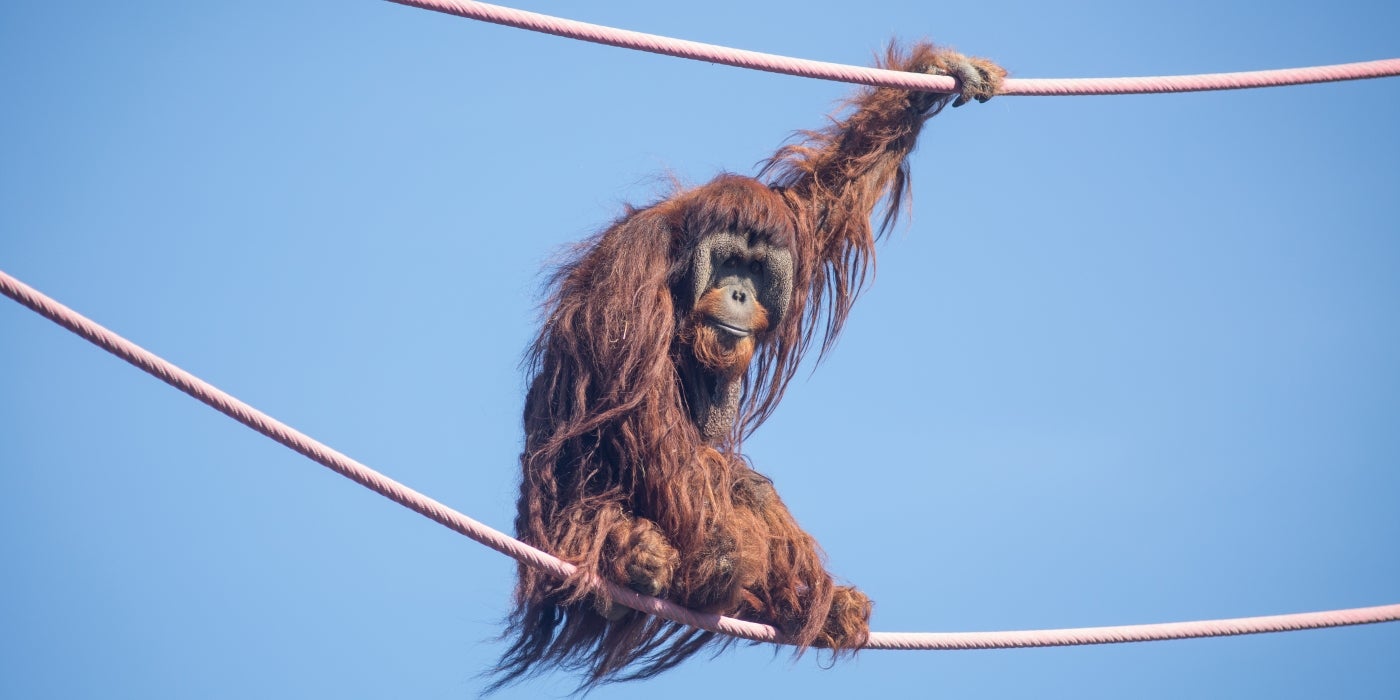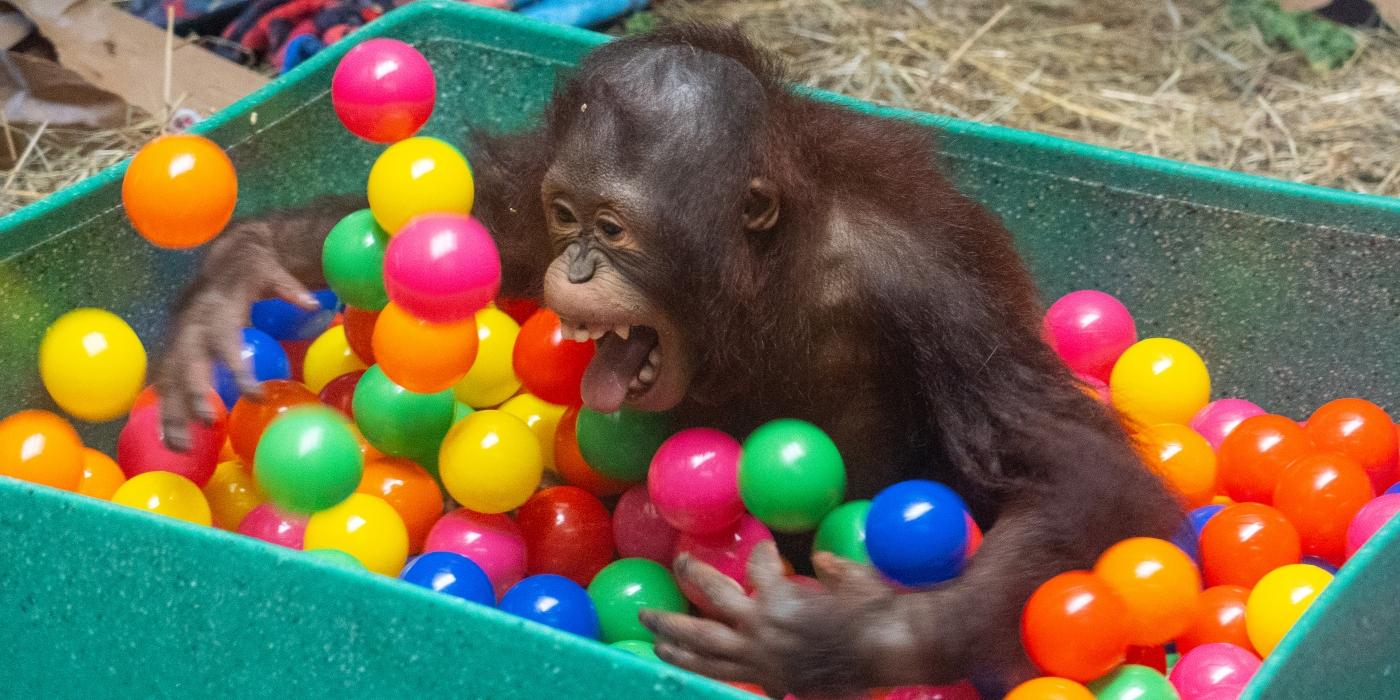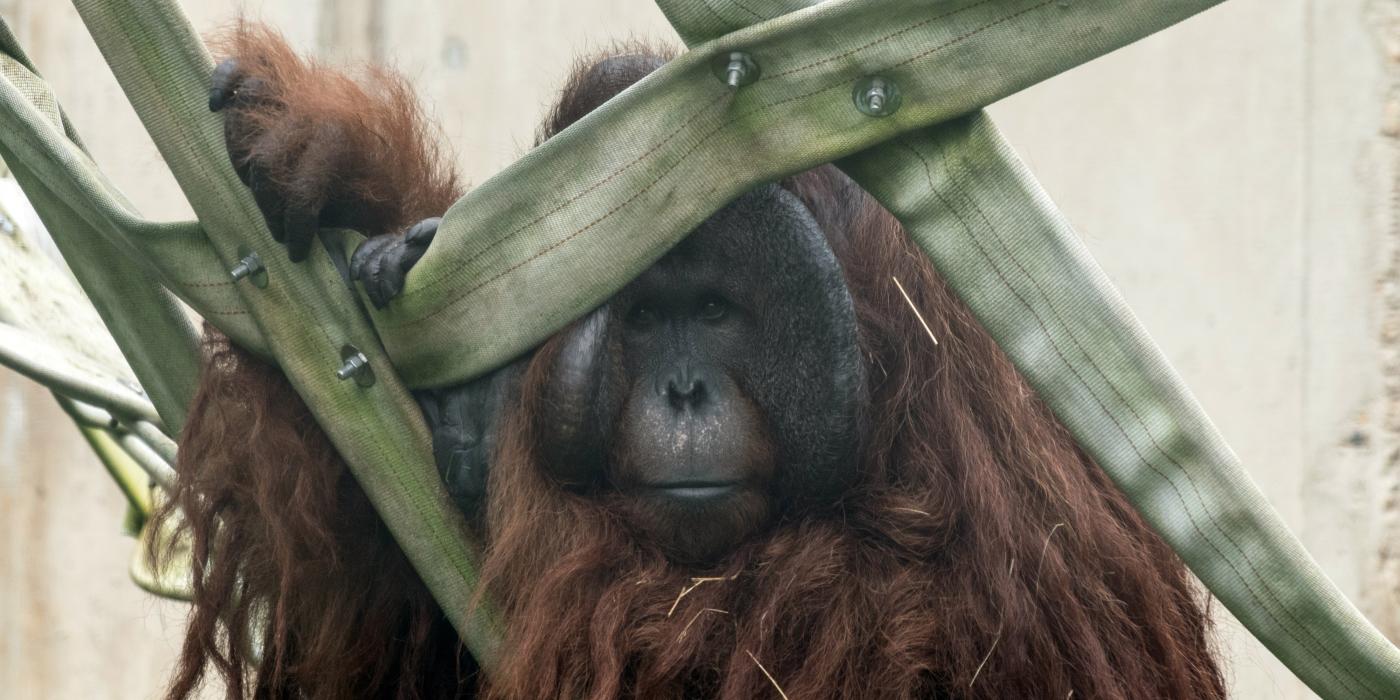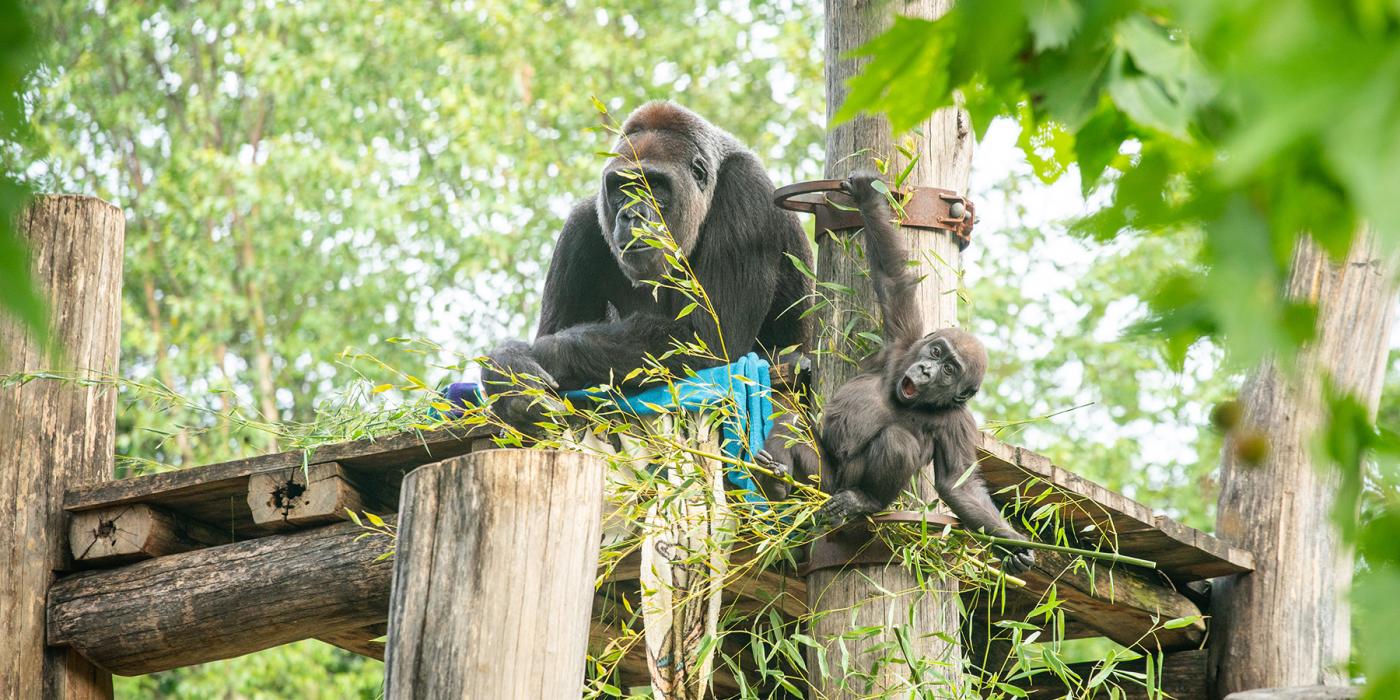#OrangutanStory: Happy 4th Birthday, Redd! (Part I)
I have been wanting to write an update on our youngest orangutan, Redd, and his relationship with his “aunties” for quite some time. As one can imagine, our typical work day has been turned upside-down since March 14! While the Smithsonian’s National Zoo was closed to help prevent the spread of COVID-19, animal keepers were on site and continued to provide for (and pamper) the animals under our care. As a fellow primate keeper detailed in our last #GorillaStory update, we assume that this novel coronavirus could pose a health risk to the non-human great apes under our care. Rest assured that our team has been taking extra steps to keep all of the primates in our unit healthy and safe during the pandemic.
Before I dive into Redd’s relationships, allow me to give some insight into orangutan behavior. Unlike other great apes (chimpanzees, bonobos and gorillas) which are troop-living and gregarious, orangutans are semi-solitary in the wild. Adult males spend most of their time alone, while females are both social and highly socially tolerant—they congregate in areas where food is available while still maintaining some distance from one another.
In human care, orangutans don’t have to worry about searching for or competing for food, so they tend to be more social than their wild counterparts. Keepers have observed our orangutans grooming one another, playing together and even forming their own social hierarchies. Each orangutan has his or her own personality and makes connections with the others based on their own personal preferences, which can vary day-to-day.
So, how does Redd fit into our orangutan social network? Well, I consider him to be a very fortunate juvenile because he has plenty of opportunities to socialize here at the Smithsonian’s National Zoo. Not only do both of his parents live here, but also several other adult orangutans with whom he has special relationships. Let’s meet some of his buddies!
Apart from Redd’s mother, 23-year-old Batang, we have three other adult female orangutans whom we lovingly refer to as Redd’s “aunties.” They are not biologically related to Redd, but they all play an important role in his life.

Lucy, our 47-year-old female, has strong opinions about her relationships. As our oldest orangutan, she is more stuck in her ways and likes to be the boss in all situations. Although she enjoys her alone time, she also has a good relationship with Batang. Lucy is in charge, and Batang does not question that fact!
Lucy enjoys her time with Redd so much that it is nearly impossible to separate them when it is time to feed them or begin husbandry training sessions. If Batang and Redd have spent the night at Think Tank, Lucy will climb the tower in the Great Ape House yard and wait for the pair to make their way across the O-Line cables. Upon seeing Lucy sitting in her “office” (the circular window in the tower), Redd will descend the tower quickly and grab hold of her immediately. They wrestle and play for hours in the yard. Although Redd’s stamina is a bit greater than Lucy’s, she does her best to keep up with him.
Like Lucy, our 43-year-old “auntie” Bonnie unabashedly dotes on Redd. Even though Bonnie’s last offspring was born more than three decades ago (our very own Kiko), her maternal instinct remains strong. In fact, when Redd’s father, Kyle, first arrived at the Zoo in 2004, Bonnie acted as a motherly figure to him. She practically carried him around, even though he was about 80 pounds at the time!
Bonnie’s caring nature made her the obvious choice as a potential foster mom to Redd in the event Batang was unable or unwilling to care for her infant. Thankfully, Batang has been a wonderful mom from the moment Redd was born Sept. 12, 2016. Of Batang’s social network, Bonnie was the first to meet Redd. While Batang held her newborn, Bonnie lay down in front of them and was seemingly smitten—she wouldn’t take her eyes off of him!
These days, Bonnie is a wonderful playmate for our young orangutan. When she is near him, she often makes a squeaking vocalization to grab his attention and signify her desire to play. Recently, she has been squeaking when she wants Redd to go with her across the O-Line. Sometimes this works, and Redd takes off after her. (Batang begrudgingly follows.) Other times, Batang figures out Bonnie’s plan and holds Redd tight if she isn’t in the mood to travel.
“Auntie” Iris’s approach to playing with Redd is the opposite of Bonnie’s. While Bonnie climbs the O-Line first and tries to get Redd to follow, our 33-year-old female simply travels after Batang and Redd to make sure playtime with him is in her future.
Iris often initiates their interactions by hiding under a sheet and sauntering over to Redd, who cannot resist the invitation to play. As a juvenile, Redd plays rough—he pulls hair, playfully bites and jumps on top of the adults. When Redd and Iris play, they will hide under blankets, roughhouse, swing and somersault. There are brief moments of pause—both of them breathing hard with their hair standing up in all directions—before getting right back into the rough-and-tumble playtime!

In the wild, an adult male orangutan would not have any role in raising a youngster, but in human care all generations and both sexes have the opportunity to socialize (if the mother allows it, of course). Bonnie’s son Kiko, who is 32 years old, has a patient and low-key attitude that lends well to tolerating a rambunctious juvenile like Redd.
As Redd becomes increasingly independent and brave, we have seen an uptick in their interactions. Frequently, Redd will wait until Kiko is sitting and relaxing with a meal, then perch himself right over Kiko’s head and try to take food out of his mouth! Redd may be able to swipe a scrap or two, but Kiko definitely retains the lion’s share. When Redd becomes a bit too pesky, Kiko will give him a gentle shove or backhand, as though he’s shooing away a fly.
Redd and Kyle play in the Great Ape House.
While Batang will let Redd interact with Kiko without much supervision, she keeps a watchful eye on her son when Kyle—Redd’s 23-year-old father—is near. As a male in his prime, Kyle often displays by vocalizing, banging on anything that makes noise and announcing his presence wherever he goes. His actions may be a bit intimidating for Batang’s taste, but we are encouraged that Kyle—like Kiko—consistently behaves appropriately whenever he interacts with Redd.
Just recently, Batang has not been as vigilant around Kyle, and she gets distracted when busy with enrichment. Redd and Kyle haven’t missed this opportunity and they have been seen wrestling! Redd is practically invisible when wrapped up in Kyle’s long hair and large cheek pads.
Redd’s most important relationship is with his mother, Batang. Orangutans have the longest infant dependency of any mammal and will nurse for up to 6 or 7 years. That is a very long commitment for an orangutan mother. At almost four years old, Redd still nurses for comfort, but not as often as he used to.
Batang has been Redd’s number one friend from the beginning, sharing an unbreakable bond between mother and son. She often wrestles and plays with him, and this summer she has been showing him how much fun it is to play in the hose water spray. They have a blast soaking themselves and stomping around in the puddles.
Batang is a very observant and attentive mother, especially when it comes to the O-Line. Over the summer, there was one instance where Redd clearly wanted to climb the tower and travel across. She expertly blocked his way to prevent him from leaving the Think Tank yard. Eventually, she was able to grab hold of his arm and coax him off the tower, through the yard and into the building. I am sure many mothers can relate to having a child who isn’t quite ready to stop playing!
Luckily, Redd has many “aunties” that can help him get out his seemingly endless bouts of energy. Batang will seek them out whenever she wants a babysitter. While they dote on Redd and play with him, she can enjoy a welcome moment of rest. Every mother needs a break now and again!
This story appears in the September 2020 issue of National Zoo News. Can’t get enough of Redd? Check out past #OrangutanStory updates. Don’t miss part II of this update on Sept. 12—Redd’s 4th birthday!
Related Species:



